Predictors of patient preference for either whole body magnetic resonance imaging (WB-MRI) or CT/ PET-CT for staging colorectal or lung cancer
- PMID: 32410378
- PMCID: PMC8425331
- DOI: 10.1111/1754-9485.13038
Predictors of patient preference for either whole body magnetic resonance imaging (WB-MRI) or CT/ PET-CT for staging colorectal or lung cancer
Abstract
Introduction: Whole body magnetic resonance imaging (WB-MRI) may be more efficient in staging cancers, but can be harder for patients to tolerate. We examined predictors of patient preference for WB-MRI vs. CT/ PET-CT for staging colorectal or lung cancer.
Methods: Patients recruited prospectively to two multicentre trials comparing diagnostic accuracy of WB-MRI with standard staging scans were sent two questionnaires: the first, administered at trial registration, captured demographics, educational level and comorbidities; the second, administered after staging completion, measured emotional distress (GHQ-12), positive mood (PANAS), perceived scan burden, patients' beliefs about WB-MRI, and preference for either WB-MRI or CT (colorectal trial), WB-MRI or PET-CT (lung trial). Preference for WB-MRI or CT/ PET-CT was analysed using logistic regression.
Results: Baseline and post-staging questionnaires were completed by 97 and 107 patients, respectively. Overall, 56/107 (52%) preferred WB-MRI over standard scans and were more likely to have no additional comorbidities, higher positive mood, greater awareness of potential benefits of WB-MRI and lower levels of perceived WB-MRI scan burden. In adjusted analyses, only awareness of potential WB-MRI benefits remained a significant predictor (OR: 1.516, 95% CIs 1.006-2.284, P = 0.047). Knowledge that WB-MRI does not use radiation predicted preference (adjusted OR: 3.018, 95% CIs 1.099-8.288, P = 0.032), although only 45/107 (42%) patients were aware of this attribute.
Conclusions: A small majority of patients undergoing staging of colorectal or lung cancer prefer WB-MRI to CT/ PET-CT. Raising awareness of the potential benefits of WB-MRI, notably lack of ionizing radiation, could influence preference.
Keywords: X-ray computed; cancer; magnetic resonance imaging; patient preference; positron emission tomography; tomography.
© 2020 The Authors. Journal of Medical Imaging and Radiation Oncology published by John Wiley & Sons Australia, Ltd on behalf of Royal Australian and New Zealand College of Radiologists.
Figures
References
-
- Pierce DA, Preston DL. Radiation‐related cancer risks at low doses among atomic bomb survivors. Radiat Res 2000; 154: 178–86. - PubMed
-
- Kim HS, Lee KS, Ohno Y, van Beek EJ, Biederer J. PET/CT Versus MRI for Diagnosis, Staging, and Follow‐Up of Lung Cancer. J Magn Reson Imaging 2015; 42: 247–60. - PubMed
-
- National Institute for Health and Care Excellence . Myeloma: diagnosis and management. NICE guideline [NG35]. (Updated 2018 October; cited 19 September 2019). Available from: https://www.nice.org.uk/guidance/ng35/chapter/Recommendations#imaging‐in....
Publication types
MeSH terms
Grants and funding
LinkOut - more resources
Full Text Sources
Other Literature Sources
Medical


